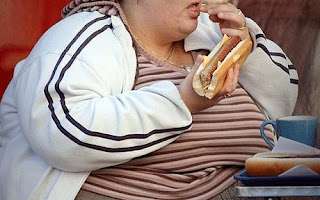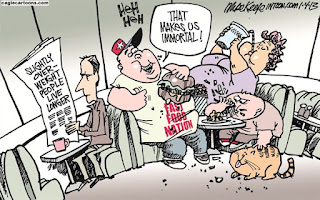Today I find myself in a wet and windy Exeter, enjoying the hospitality of the library in the city centre which has been thoughtfully provided with a pleasant little coffee shop in the vestibule. The castle backs on to the grounds of a centuries old Norman castle which, in recent years, has been thoughtfully landscaped to provide a very pleasing setting on a warm summer's day. Unfortunately, at the time of writing, warm summer's days are but a distant hope; the ground beneath one's feet squelches to the tread and all is soggy and waterlogged, adding an extra incentive to stay within the confines of the building and enjoy the fayre on offer here.
Apart from a wide variety of cakes and similar comestibles, the fayre seems reasonably fair in this place, in contrast to most establishments I have visited since returning to the UK. What passes for food in this benighted land is normally high in fat, swimming in grease or comes pre-wrapped from a factory, bearing little or no resemblance to anything natural or organic. Quite often these packets come with pretty little labels indexing all the various ingredients and percentages thereof and just how much fat, carbohydrate and protein is contained therein. Little or no food seems to come in its natural form, unprocessed or sans addictive that add little to the nutritional value.
These days, such 'food' is the standard fayre on offer in the UK; if one requires anything beyond the range of these mundane offerings one is required to both search far and wide and to pay out a proverbial arm and a leg. Most don't bother, or simply cannot afford to bother, hence insuring an unremittingly poor diet for themselves and their families.
For all my criticisms of China, and there were many, the diet there is infinitely better (and infinitely cheaper) than it is here. One comes across the odd rotund person in China, but the norm, even into great age, is slim and fit-looking people. The contrast with the UK could not be more stark, and seems to become more and more obvious each time I return from one of my sojourns.
The streets of Exeter seem to be filled to bursting with the rotund, the generously-proportioned, the wide-of-berth, the ample-figured, the big-boned, the plus-sized, the hefty, the chubby, the plump, the obese and even, what we used to call in previous, less politically correct times, the fat. They wibble and wobble down the street, huffing and puffing, panting and grunting; so much so in fact that one is concerned as to their very survival whenever they are met with such severe challenges as an incline, a few steps or a slightly more than normally substantial door..
A close friend of mine insists that these people are their own worst enemies, that the choices they make dictate the state of their bodies, that they really should have the self-discipline to make appropriate food choices and to take a little exercise occasionally. Personally, I feel that is a tad unfair given the type of fayre that is normally on offer in the supermarkets and hostelries of this land. There really isn't that much choice, particularly if you live in straitened circumstances, as so many do in what the Daily Mail insists is economically successful Britain.
Another good friend espouses a type of conspiracy theory wherein the great mass (no pun intended…) of people are fed rubbish in order to render them suitable customers for the pharmaceutical industry as their health inevitably deteriorates. Again, I would not fully subscribe to such ideas, but one has to admit that the average UK citizen is usually imbibing a copious cornucopia of tablets and other forms of medication by the time they reach the ripe old age of fifty. Huge sums do indeed seem to be made at both ends of this equation, firstly in feeding people such poor food as to lead inevitably to obesity, and secondly from the doomed attempts to deal with the concomitant health problems such as cardiovascular disease, high blood pressure and diabetes.
Many moons ago, back in the nineties, I enjoyed an interesting, if somewhat challenging, trip to India. As happens to so many who take on extended visits to that land, I managed to contract a form of 'Dehli-belly' (appropriately enough in Dehli) and came back from my travels some 10 kgs lighter than when I left. The people of the sub-continent were, in those far off days, more or less inevitably slim. A couple of months later, I followed that trip with another to Florida, my first to the United States. The contrast could not have been greater. On my first morning, I came across my first mall and my first food section, stuffed full of fast-food outlets. A few metres in front of me, bound for the same outlets, was a woman of indeterminate age wearing, perhaps unwisely, shorts and a singlet. She must have been at least 150 kgs, probably more. As I observed her ponderous advance towards her fervently desired destination I found myself trying to work out within which folds, of a very high number of folds in her ample legs, her knees were contained. The image reminded me oddly of the Michelin Man in those wonderfully antediluvian French posters.
At the time it was known that the US was in the midst of an obesity crisis. Little did I realise that just a few years later many of those same fast-food outlets would be littering the streets of the UK (and indeed, Europe and the World) bringing with them the subsequent problems and deleterious effects on the nations health, perhaps particularly on a younger generation who have scarcely ever known anything better.
Back in the library café, the rain is lashing hard against the windows as I finish this week's offering. Currently in the West country, it tends to vary between drizzle and violent downpour, so I await my chance to get merely slowly soaked rather than drowned beneath a veritable inundation. In the meantime I have treated my self to a second Americano but, in view of the above, resisted the temptation to indulge in the various cakes, muffins and sticky buns on offer ...












